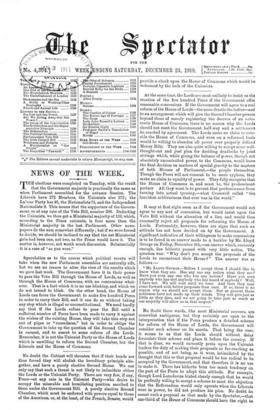At the same time, the Lords are most unlikely to
insist on the creation of the five hundred Peers if the Government offer reasonable concessions. If the Government will agree to a real reform of the House of Lords—the more drastic the better—and to an arrangement which will give the Second Chamber powers beyond those of merely registering the decrees of an auto- cratic House of Commons, there is no reason why the Lords should not meet the Government half-way and a settlement be reached by agreement. The Lords make no claim to over- ride the House of Commons, and even on a reformed basis would be willing to abandon all power over properly defined Money Bills. They are also quite willing to accept some well- thought-out and just plan for deciding deadlocks by joint sittings which, while giving the balance of power, though not absolutely uncontrolled power, to the Commons, would leave the final decision on matters of special gravity to the masters of both Houses of Parliament,—the people themselves. Though the Peers will not consent to be mere cyphers, they make no claim to equality of power. They fully recognise that the House of Commons is, and must be, the predominant partner All they want is to prevent that predominance from turning into actual tyranny,—what Cromwell called " the horridest arbitrariness that ever was in the world."






































